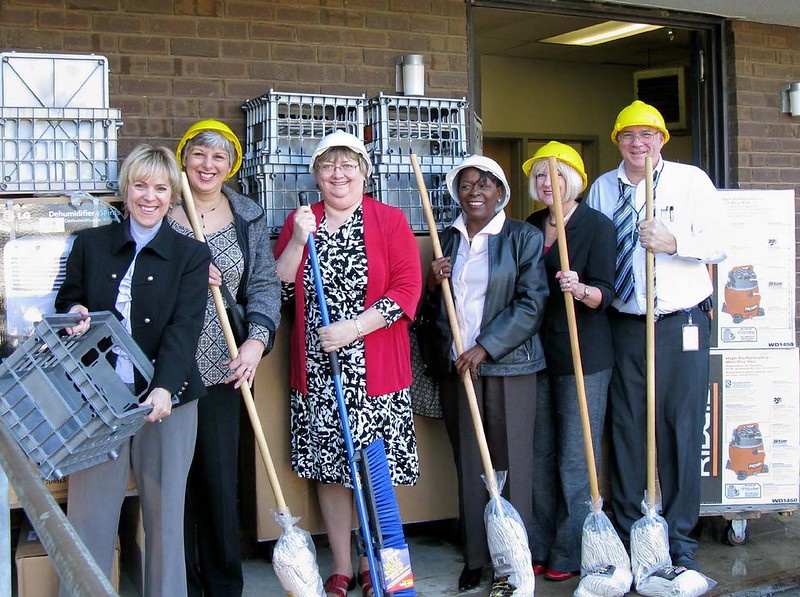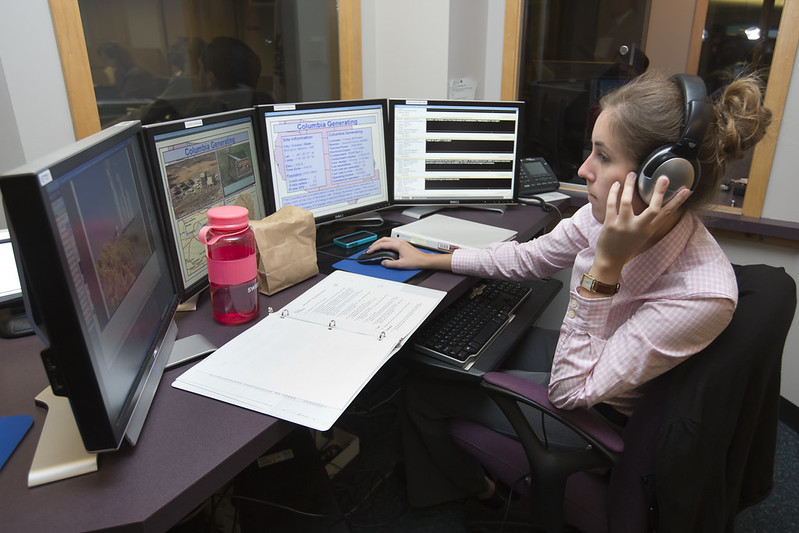Libraries at the Disaster Preparedness Table

by New Jersey State Library on Flickr (CC BY-NC 2.0)
Libraries have an important role to play in disaster response planning, and their contributions are welcomed at community disaster preparedness exercises. Building on its Creating Pathways to Civil Legal Justice foundational course series, WebJunction is launching a new series Navigating Civil Legal Issues of Natural Disasters, which addresses how libraries can support the civil legal information needs of patrons that arise in a natural disaster. As part of that initiative, WebJunction staff members were invited to participate in an activity that community emergency response teams use to periodically prepare for disasters. This story shares their experiences contributing to this exercise and reflects on the roles that libraries have in community disaster preparedness and response.
I was surprised at how anxious I became as images of the earthquake appeared on a scheduled Zoom call with the California statewide Disaster Legal Assistance Collaborative. I was seated comfortably in my Seattle office, knowing this was all a virtual preparedness exercise, but my heart rate increased, I sat up tall, and I worried.
My WebJunction colleague and I had been invited to participate in an Earthquake Table Exercise—an activity that emergency response teams conduct periodically to anticipate their responses to likely disaster scenarios. This was a novel experience for us as part of our development of a new WebJunction course series, Navigating Civil Legal Issues of Natural Disasters. We are collaborating with legal aid attorneys who have extensive experience in natural disasters to develop this course series, and we were excited to participate in one of these table exercises.
We joined the Zoom call with about 25 others, some emergency management representatives, but mostly legal assistance providers. The moderator set the stage of the disaster scenario with images, video, and a description of the disaster. She told us it was an 8.1 quake with the epicenter just south of the city of Hayward. Fires are raging, sparked by ruptured gas lines, and the power goes out immediately across the East Bay, parts of San Francisco, and Marin County. Cell phone towers are down in parts of the East Bay, and the internet is out. Bridges are closed for everyone except emergency personnel. Then, with the scene set, in the first of two breakout rooms, participants were given particular roles to play as we discussed the priorities for the next 24 hours, and then for the next 72 hours. I was so struck by how much of our information and communication is electronic and might not be accessible right after a disaster. Hard copies of important names and numbers and old-fashioned phone trees became the solution.
After productive breakout discussions, we reconvened in the plenary room and shared ideas. Then the moderator took us forward in time with more images and video to day five of the disaster, when some basic resources (e.g., power in some areas; cell service in most areas; internet services coming back slowly; some bridges open) became available and some mobile disaster relief centers were being set up. Courthouses and legal aid offices were still closed, and fires were burning in remote areas. Back in our same breakout groups, we discussed what our new priorities would be and what we needed in order to respond to community needs at this new juncture. The exercise concluded with more discussion of what we learned and what the group’s action items would be to better prepare for an actual disaster.

Regulatory Commission on Flickr (CC BY 2.0)
It was an incredibly valuable experience to represent the library perspective at the table with seasoned emergency responders. The library became very popular in our breakout rooms. Many of the legal aid folks attending had not thought of the library playing a role in disaster recovery. We reminded them of the role many libraries played after Katrina. We pointed out that libraries are centrally located and frequently have generators, as well as computers, Wi-Fi, printers, faxes, and information professionals, to help people begin to navigate the recovery process. Libraries can be cooling or heating centers or a place to simply rest for a moment or to allow your child to find a book to check out.
During this exercise, my colleague and I encouraged legal aid attorneys to remember the library, invite them to these exercises, and build relationships to learn about how they could partner to help a community prepare and recover from a disaster. WebJunction has created a flyer, Public Libraries as Partners in Access to Justice (pdf) that can be used to introduce legal aid organizations to partnering with public libraries.
As WebJunction continues its partnership with the Legal Services Corporation, we are expanding the ways that libraries can be involved in helping patrons navigate their legal information needs. This new area of focus is on the specific needs of community members in the wake of a natural disaster. We know natural disasters are becoming more frequent, no longer confined to predictable seasons or specific geographic regions. All parts of the country need to be thinking about how to prepare for natural disasters. In WebJunction’s upcoming course series Navigating Civil Legal Issues of Natural Disasters, library staff will learn to identify the cycle of emergency response, to recognize the civil legal issues related to natural disasters, and to apply a trauma-informed approach to the emotional intensity of these situations. They will learn how FEMA works and how to provide guidance on navigating the application and appeals processes. The courses will also help library staff build a collection of disaster-relevant information resources and develop relationships with other organizations that work in the disaster space.
The new course series will be launching in September, when we’ll also be hosting a webinar, Civil Legal Issues of Natural Disasters: Libraries Can Help. Legal aid attorneys will share insights based on their personal experiences in natural disasters to introduce library staff to civil legal issues that may arise during a variety of natural disasters. Join us for the webinar to learn how to apply reference skills to support community members through this civil legal turmoil and guide them toward positive outcomes.
Learn more about legal services
- Learn more about the new course series, Navigating Civil Legal Issues of Natural Disasters
- Enroll in the foundational course series, Creating Pathways to Civil Legal Justice, also available for free in WebJunction’s Course Catalog
- Make the case for partnering with public libraries to improve access to justice for Legal Aid Organizations (pdf) and Law Libraries (pdf).
- Watch the September 2022 Webinar: Civil Legal Issues of Natural Disasters: Libraries Can Help
- Civil Legal Assistance in Natural Disasters: A Role for the Library
- Find additional resources related to libraries and legal services: oc.lc/legal-justice
